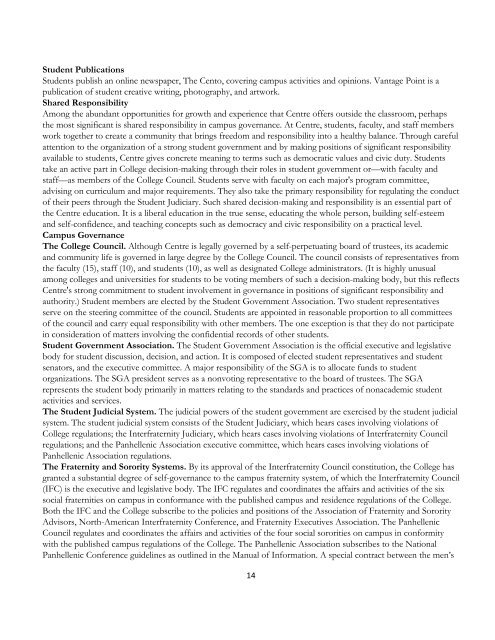catalog2015-16
You also want an ePaper? Increase the reach of your titles
YUMPU automatically turns print PDFs into web optimized ePapers that Google loves.
Student Publications<br />
Students publish an online newspaper, The Cento, covering campus activities and opinions. Vantage Point is a<br />
publication of student creative writing, photography, and artwork.<br />
Shared Responsibility<br />
Among the abundant opportunities for growth and experience that Centre offers outside the classroom, perhaps<br />
the most significant is shared responsibility in campus governance. At Centre, students, faculty, and staff members<br />
work together to create a community that brings freedom and responsibility into a healthy balance. Through careful<br />
attention to the organization of a strong student government and by making positions of significant responsibility<br />
available to students, Centre gives concrete meaning to terms such as democratic values and civic duty. Students<br />
take an active part in College decision-making through their roles in student government or—with faculty and<br />
staff—as members of the College Council. Students serve with faculty on each major's program committee,<br />
advising on curriculum and major requirements. They also take the primary responsibility for regulating the conduct<br />
of their peers through the Student Judiciary. Such shared decision-making and responsibility is an essential part of<br />
the Centre education. It is a liberal education in the true sense, educating the whole person, building self-esteem<br />
and self-confidence, and teaching concepts such as democracy and civic responsibility on a practical level.<br />
Campus Governance<br />
The College Council. Although Centre is legally governed by a self-perpetuating board of trustees, its academic<br />
and community life is governed in large degree by the College Council. The council consists of representatives from<br />
the faculty (15), staff (10), and students (10), as well as designated College administrators. (It is highly unusual<br />
among colleges and universities for students to be voting members of such a decision-making body, but this reflects<br />
Centre's strong commitment to student involvement in governance in positions of significant responsibility and<br />
authority.) Student members are elected by the Student Government Association. Two student representatives<br />
serve on the steering committee of the council. Students are appointed in reasonable proportion to all committees<br />
of the council and carry equal responsibility with other members. The one exception is that they do not participate<br />
in consideration of matters involving the confidential records of other students.<br />
Student Government Association. The Student Government Association is the official executive and legislative<br />
body for student discussion, decision, and action. It is composed of elected student representatives and student<br />
senators, and the executive committee. A major responsibility of the SGA is to allocate funds to student<br />
organizations. The SGA president serves as a nonvoting representative to the board of trustees. The SGA<br />
represents the student body primarily in matters relating to the standards and practices of nonacademic student<br />
activities and services.<br />
The Student Judicial System. The judicial powers of the student government are exercised by the student judicial<br />
system. The student judicial system consists of the Student Judiciary, which hears cases involving violations of<br />
College regulations; the Interfraternity Judiciary, which hears cases involving violations of Interfraternity Council<br />
regulations; and the Panhellenic Association executive committee, which hears cases involving violations of<br />
Panhellenic Association regulations.<br />
The Fraternity and Sorority Systems. By its approval of the Interfraternity Council constitution, the College has<br />
granted a substantial degree of self-governance to the campus fraternity system, of which the Interfraternity Council<br />
(IFC) is the executive and legislative body. The IFC regulates and coordinates the affairs and activities of the six<br />
social fraternities on campus in conformance with the published campus and residence regulations of the College.<br />
Both the IFC and the College subscribe to the policies and positions of the Association of Fraternity and Sorority<br />
Advisors, North-American Interfraternity Conference, and Fraternity Executives Association. The Panhellenic<br />
Council regulates and coordinates the affairs and activities of the four social sororities on campus in conformity<br />
with the published campus regulations of the College. The Panhellenic Association subscribes to the National<br />
Panhellenic Conference guidelines as outlined in the Manual of Information. A special contract between the men’s<br />
14


